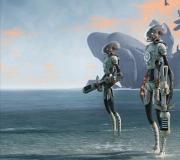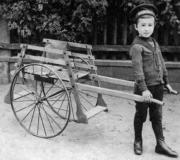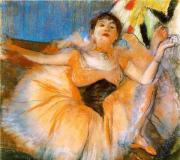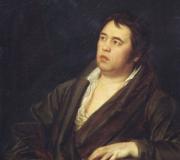Jack London "Love of Life": description, hero, analysis of the work. An essay on a work on the topic: What is the meaning of life? (Based on the story by D
London D.
An essay on a work on the topic: What is the meaning of life? (Based on the story by D. London "Love of Life")
Jack London was engaged in literary creativity for about twenty of the forty years he lived, and the writer’s successes are amazing. Contemporaries followed the rise and fate of Jack London with joy and undisguised interest. They tried to turn the writer into a living advertisement for a “society of equal opportunities,” that is, America. Like, here is the embodiment of ideas about a real society: a farmer’s stepson, a hard-working boy who could not get a higher education, but still managed to achieve his dream: he became a popular writer. But in reality everything was not so simple. Jack London's life was a kind of self-immolation for the sake of success. Such a struggle was exhausting. The writer was doomed to endure incredible workloads for the sake of profitable reporting and writing work.
Jack London wrote: “It’s strange for me to think now about how selflessly I worked, about how poor I was and how passionately I wanted to succeed, and also how happy I was.”
The first, so-called northern, stories of Jack London surprised readers with a new formulation of the problem and their artistic embodiment. The heroes of these stories were left alone with the harsh Arctic nature, which tested their strength. As a realist writer, Jack London followed the footsteps of life in his work. People were driven to the North by the desire to earn easy money; this period was called the “gold rush.” Among the real, courageous and strong heroes in the North were also scoundrels who brought with them the brutal laws of the “society of equal opportunities”: extreme individualism, the desire to get rich at any cost, an insatiable addiction to the “yellow devil”. In the harsh white silence of Alaska, the delirium of the “gold rush” is intricately intertwined with high romance. This left a very unique imprint on the character of every inhabitant of the American North.
In the story “Love of Life,” Jack London portrayed two gold-digging friends who return home after a successful search for the yellow metal. One of them sprained his leg and asked his companion for help. But he abandoned his comrade in trouble and moved on, taking with him part of the loot. His friend, left alone, desperately fights for life. He. decides to move on, despite the pain, but loses his way. Walking with an injured leg becomes more and more difficult, and the hero thinks about what to do with his share of the loot. He was faced with a choice: get rid of gold as an extra burden or get rid of all other things. He did not dare to leave the gold in the land to which it belonged before. The gold miner was exhausted from hunger. He tried several times to catch a partridge, but without success. “Watching the partridge fly away, he felt such hatred towards her, as if she had done him a terrible harm.” He fell into unconsciousness, became delirious about food, but when he came to his senses, he felt only pain from hunger in his stomach. When the wet snow extinguished the fire, the traveler reached the extreme point of suffering and began to think that dying was not as painful as living. But through his powerlessness, an endless love for life broke through and forced him to rise and move on again and again. The hero managed to reach the people, but at the end of the journey a symbolic event occurred: he saw the remains of his traitor friend. For a long time, the survivor was haunted by the fear of starvation.
Jack London's story makes the reader think about such concepts as life and death, betrayal and friendship, and the relativity of material values.
The works of many famous writers reflect their life stories. This can be seen especially clearly when reading the exciting and fascinating stories of Jack London, my favorite writer. Having seen and experienced a lot during his short but turbulent life, he constantly subjects his heroes to tests, forces them to overcome difficulties and make choices. And since many stories take place in the Far North, human life often depends on the right decision.
“Love of Life” is a story of the struggle for existence.
Two heroes, completely different from each other, two stories, two types of struggle, one of which was doomed to defeat. Yes, surprisingly, Bill lost - healthy and strong, leaving his hungry comrade who had sprained his leg to the mercy of fate, but until his last minute he did not let go of the precious bag of gold. Gold and the passion for profit killed the man in him, first spiritually and then physically.
We see the main character completely differently. The author doesn't even give him a name, because in this case it really doesn't matter. Left alone, alone with his illness and hunger, in the cruel conditions of the wild northern nature, this man constantly fights for the most precious thing he has - for his own life. He understands that gold is worthless in itself, and without regret parting with it when the time comes. At times it seems that there is nothing human left in this creature, which the author once even compares to a “giant worm.” However, the spark of love for life, which “did not want to perish in him and drove him forward,” allowed him to defeat even death.
The author once again helps us understand that there is nothing more valuable in the world than human life. However, provided that we are talking about the life of a Person.
(No Ratings Yet)
You are currently reading: The struggle for life (based on the story by D. London “Love of Life”) (1 option)
History of the story
The story “Love of Life” was written by American writer Jack London in 1905, published in a collection of stories about the adventures of gold miners in 1907. It seems possible that the story has a share of autobiography, at least it has a real basis, since the writer acquired considerable life and writing experience, sailing as a sailor on schooners and taking part in the conquest of the North during the days of the “gold rush”. Life provided him with a lot of impressions, which he expressed in his works.
Adding to the authentic reality is the geographic detail with which the author depicts the path of his hero - from Great Bear Lake to the mouth of the Coppermine River, which flows into the Arctic Ocean.
Plot, characters, story idea
The end of the 19th century was marked by a whole chain of “gold rushes” - people in search of gold massively explored California, the Klondike, and Alaska. A typical picture is presented in the story “Love of Life.” Two friends traveling in search of gold (and having mined a decent amount) did not calculate the strength for the return trip. There are no provisions, no cartridges, no basic mental and physical resources - all actions are performed automatically, as if in a fog. The hero, crossing a stream, trips and injures his leg. A comrade named Bill leaves him without the slightest hesitation and leaves without even looking back.

The main character remains to fight. He cannot get animal food; the fish from the small lake escape, despite the fact that he manually scoops up all the water from the reservoir. The gold had to be abandoned due to its weight. Bill's fate turned out to be sad - the nameless hero came across a pile of pink bones, rags of clothes and a bag of gold.
The story culminates in an encounter with a wolf, too sick and weak to attack a man, but clearly expecting to feast on the man's corpse when he dies from exhaustion and exhaustion. The hero and the wolf guard each other, because he is in equal conditions and in each of them the instinct of survival speaks - the blind and strongest love for life in the world.

The main character pretends to be dead, waiting for the wolf to attack, and when he attacks, the man doesn’t even strangle him - he crushes him with his weight and gnaws the wolf’s neck.
Near the sea, the crew of a whaling ship notices an absurd, scurrying creature on the shore, crawling towards the water's edge. The hero is accepted onto the ship and soon they notice his strangeness - he does not eat the bread served for dinner, but hides it under the mattress. Such insanity developed due to the long, insatiable hunger that he had to experience. However, this soon passed.
The story is built on the opposition, first of Bill and the nameless hero, then of the nameless hero and the wolf. Moreover, Bill loses in this comparison, since he is compared taking into account moral criteria and is defeated, while the wolf remains on an equal footing with the hero, since nature knows no pity, just like a person brought to the last line.

The main idea of the story is the idea that man’s struggle with nature for the right to exist is merciless, despite the fact that man is also armed with reason. In critical situations we are guided by instinct or love of life, and practice shows that the fittest survive. Nature does not know pity or condescension towards the weak, equalizing the rights of predators and herbivores. From the point of view of natural survival, Bill considered himself right in getting rid of the ballast in the form of a wounded friend. But it’s more important to remain human to the end.
Having stumbled upon the remains of his dead comrade in the tundra, he does not gloat and takes his gold for himself. He does not rush to the remains out of hunger (although the day before we see him eating live chicks), and this becomes the last, extreme manifestation of human dignity.
Composition
It is hardly possible to remember a more popular foreign writer than Jack London, whom A.V. Lunacharsky called “the great writer of America.” Coming from the people, he drew the best from his surroundings. “...I went to the Klondike for gold. By the end of the year, scurvy began and I was forced to leave. In the Klondike I found myself. Everyone is silent there. Everyone thinks. There we develop a correct outlook on life. My worldview was also formed,” Jack London wrote about himself. His worldview is based on a deep faith in man, in his strengths, his capabilities, therefore the writer’s works are imbued with the spirit of the struggle for justice, for life.
The strength and weakness of a person, his true qualities are most clearly manifested in difficult life situations. Therefore, in his stories, Jack London rarely characterizes his heroes. He forces them to reveal themselves, showing courage and perseverance in the fight against the forces of nature, making a choice between good and evil.
For example, the very beginning of the story “Love of Life” tells us a lot about the heroes of the work. Two travelers limping down to the river. Both of them are tired and exhausted, their faces express “patient humility - a trace of long hardships.” They begin to cross the river, suddenly one traveler slipped on a smooth boulder and almost fell, but stayed on his feet, crying out loudly in pain. The second one still walked forward, without even looking back. Apparently, they had been on the road for a long time, overcoming difficulties together, but Bill did not hesitate to leave his comrade to die alone, without weapons, water and food. And he could not believe in the betrayal. He made his way forward with difficulty, convincing himself that “Bill, of course, was waiting for him at the hiding place. He had to think so, otherwise there was no point in fighting further - all that was left was to lie on the ground and die.” We see that day by day it is becoming more and more difficult for the hero of the story to move, to find food for himself, that he is increasingly overcome by a feeling of hopelessness. But the man continues to crawl on the wet moss, despite the fact that his clothes are wet and his body is cold; he continues to fight for life, afraid of dying from unbearable hunger. But then it turns out that an even greater danger awaits him: “to die a violent death before the last desire to preserve life fades away in him from hunger.” There were wolves all around, who could attack and kill at any moment. But the hero of the story is a real person. He found the strength to overcome the cold, hunger, and fear, and decided to fight the wolf. He also found the strength to part with the gold for which he risked
life, because in the struggle for life, true values come first. He would not betray, would not leave a wounded friend in trouble. The author does not call his main character by name, because that is what a Man should do. Until the last breath, maintaining dignity, courage, love and desire for life.
Is it possible to resist the strength emanating from the work, the resilience of human character, so skillfully depicted by the writer.
The works of Jack London still arouse keen interest among readers today, thanks to the strength of spirit, the fortitude of the characters, and the energy with which the author filled them. The courage of the heroes of his stories originates in popular ideas about human dignity. The heroes of his works teach us a deep belief in the inexhaustibility of human strength, love of life, and perseverance, which help to overcome difficulties, survive in harsh conditions and emerge victorious from any life situations.




